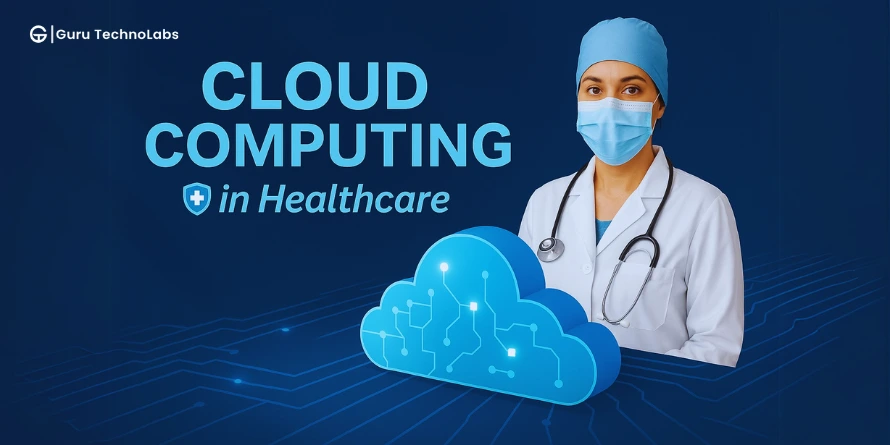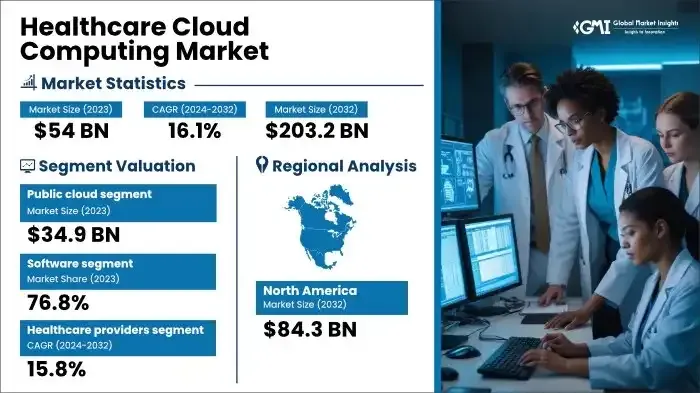Cloud Computing in Healthcare: Benefits, Applications & the Future of Smarter Care

Picture a hectic hospital ward where doctors rush to read patient records, nurses are phoning it in, and crucial calls are made based on minimum, stale information. Now, imagine a different world, a world in which all patient data is always available on any machine, peak diagnoses can be aided with real-time analytics, and doctors can collaborate anywhere in the world without barriers of geography or time, to place a few examples.
This is where cloud computing comes into the picture. The healthcare industry has been tapping into cloud tech to streamline processes, cut expenses, and improve clinical results, especially in the present digital era.
No longer are there standalone, paper-based systems, cloud computing provides the platform to connect the fragmented data, improve operations, and drive acceleration in the healthcare industry.
In this blog, we will explore in detail how cloud computing is transforming healthcare with the key benefits, applications, and the effect it’s having on the future of the industry.
What is Cloud Computing in Healthcare?
Cloud computing in healthcare means the use of online software platforms and services to securely store, manage, and process healthcare information. It allows healthcare providers to store data remotely, streamline operations, collaborate effectively, and reduce the need for large fixed investments in IT infrastructure on the premises.

Source: Global Market Insights
The global healthcare cloud computing market size was valued at $32.4 billion in 2020 and is expected to reach $120.6 billion by 2029 at a CAGR of 19.2% by the year 2032. This growth is indicative of the adoption of cloud solutions to foster innovation, efficiency, and cost savings within healthcare.
In conclusion, cloud computing is revolutionizing the health industry, cracking the problems of security, scalability, and efficiency to loop in a seamless experience for the patient as well as the provider.
How Cloud Computing is Transforming Healthcare?
Cloud computing is changing healthcare by providing more efficient ways to manage data, collaborate across teams, and enhance patient care. By making healthcare systems more connected, scalable, and cost-effective, cloud technology is bridging gaps in care delivery and opening new possibilities for both patients and providers.
Here’s how it’s changing the industry:
Improved Data Access and Collaboration
Cloud computing enables healthcare professionals to access patient data in real time from any location, eliminating delays in care.
For example, doctors in remote areas can now consult with specialists in urban centers, sharing critical patient information instantly.
According to McKinsey, telemedicine visits in the U.S. surged by 78 times in 2020, largely due to cloud-based platforms that allow secure video consultations and the easy sharing of medical records.
Enhanced Patient Care Through Real-time Analytics
With cloud-powered solutions, healthcare providers can use data analytics to predict patient outcomes, identify risks, and provide personalized treatment plans. AI algorithms, powered by cloud infrastructure, can analyze vast amounts of health data to detect patterns and make real-time recommendations.
Hospitals like Mount Sinai in New York are already leveraging cloud-based predictive analytics to reduce patient readmission rates and optimize care plans.
Data Security and Compliance
One of the biggest challenges in healthcare is ensuring the security of sensitive patient data. Cloud computing enhances data security by incorporating advanced encryption protocols, multi-factor authentication, and compliance tools.
Cloud providers are often better equipped to ensure regulatory compliance with standards like HIPAA.
For instance, Amazon Web Services (AWS) offers a dedicated HIPAA-compliant cloud infrastructure, enabling healthcare providers to securely store and manage patient information.
Scalability for Growing Demands
Healthcare providers often face ups and downs in how many patients are coming through their doors, particularly during health emergencies such as the pandemic. Cloud computing allows scaling of resources on demand for healthcare systems to manage spikes in demand.
Many healthcare organizations leveraged cloud platforms to rapidly deploy virtual care solutions during the pandemic to maintain continuity of care when in-person visits were constrained.
The truth is that cloud computing is much more than a new technology, it is a vehicle that will enable the transformation of the healthcare industry into a new era of efficiency, security, and patient focus. Innovating in care delivery is daunting, but healthcare providers are using the power of the cloud to do just that while eliminating barriers.
Benefits of Cloud Computing In Healthcare
Cloud computing comes with many advantages for patients as well as health care organizations. By providing data availability, seamless communication, and cost-cutting measures, cloud solutions improve the overall healthcare experience and facilitate operational efficiency.
That’s where cloud computing makes a difference:
Benefits for Patients
Improved Access to Care
- Cloud-based systems, for instance, store patients’ health information and medical history, which can be accessed anytime by patients on any device, thereby allowing them to entangle themselves with any kind of treatment plan during their consultations.
- So, a patient traveling for work can quickly check their latest test results or communicate with their doctor without having to be in the same place.
Telemedicine and Remote Consultations
- For patients in underserved areas, cloud-powered telemedicine platforms provide virtual consultations with specialists that would otherwise be inaccessible.
- Take the example of a patient in a rural area who needs a dermatology consultation – they can now have a video call with a dermatologist and receive immediate care without leaving their home.
Personalized Care and Real-Time Monitoring
- Cloud platforms allow healthcare providers to monitor chronic conditions like diabetes, heart disease, or asthma in real time.
- Patients can wear devices that send data directly to the cloud, where healthcare professionals can track vital signs and adjust treatment plans accordingly, ensuring better outcomes. It can be achievable with wearable device apps.
Faster Treatment and Diagnosis
- By storing patient data in the cloud, doctors can quickly access medical histories, test results, and imaging reports.
- This faster access leads to quicker diagnoses and more timely interventions, reducing the chances of complications or delays in treatment.
Benefits for Healthcare Organizations
Cost Savings
- By using the principles of cloud computing, healthcare organizations do not have the burden of expensive on-premises infrastructure (like physical servers and storage) or the maintenance associated with on-site infrastructure.
- As reported by Forbes, organizations that migrate to the cloud can save IT infrastructure and maintenance costs up to 30%.
Scalability and Flexibility
- Another advantage of cloud solutions is their ability to scale resources up or down based on patient demand.
- For example, in a health crisis such as the coronavirus pandemic, hospitals could rapidly scale cloud-based systems to accommodate a surge in virtual care appointments without straining the underlying infrastructure.
Improved Collaboration And Communication
- Cloud computing makes collaboration between healthcare teams better. Doctors, nurses, and specialists can view the same patient records, exchange insights, and make decisions together in real time.
- This results in better-coordinated care and a reduced chance of errors, which can ultimately lead to improved patient outcomes.
Data Security and Compliance
- Cloud platforms, equipped with built-in compliance features, ensure that healthcare organizations comply with regulatory requirements such as HIPAA.
- For example, although encryption, multi-factor authentication, and data backup capabilities are well-established technologies, they can be difficult to implement and often lie outside the budget of healthcare organizations, but cloud providers have much greater economies of scale across their user bases with considerably more resources to invest, reducing the overall risk of data breaches and keeping sensitive patient data secure.
Improved Patient Engagement and Satisfaction
- Healthcare providers can offer an online portal to their patients through which they can book an appointment, see their test results and health progress.
- It allows patients to manage their healthcare and enhances satisfaction and compliance with treatment plans.
Efficient Data Management and Analytics
- Cloud computing enables healthcare organizations to store vast amounts of data in a centralized, organized way.
- With cloud-based data analytics, healthcare professionals can gain valuable insights into patient trends, treatment effectiveness, and resource utilization, which can lead to better decision-making and improved operational efficiency.
Key Cloud Computing Applications in Healthcare
Cloud computing is revolutionizing healthcare by enabling secure, efficient, and scalable solutions. Here are some key applications that are transforming the healthcare industry. These applications span across various types of healthcare software, each playing a vital role in optimizing clinical workflows.
1. Electronic Health Records (EHR): EHR systems store patient data in a cloud-based environment that is secure and enables healthcare providers to retrieve real-time information from anywhere in the world.
2. Telemedicine Platforms: Cloud-based telemedicine solutions allow the remote consultation of patients with healthcare providers.
3. Cloud-Based Healthcare Data Analytics: This service allows healthcare corporations to analyze a lot of health records, thereby enhancing their decision-making.
4. Medical imaging and diagnostics: Cloud-based platforms allow medical images to be securely stored and shared, facilitating easier collaboration between healthcare professionals on diagnoses.
5. Clinical Collaboration Tools: Communication in healthcare can be optimized by using cloud collaboration tools.
6. Wearable Health Devices Integrations: Cloud technology accommodates data from wearables for health, allowing doctors to monitor the patients’ health around the clock.
7. Healthcare Application Development: Cloud computing provides infrastructure that can be used to develop scalable healthcare applications to enhance the patient’s engagement.
8. Patient Portal Systems: Cloud-based patient portals provide patients with access to their medical records, test and lab results, and appointment schedules.
9. Drug Discovery: IaaS cloud computing services simplify and expedite the complex drug discovery process. The Pfizer article with BioNTech for the development of the COVID-19 vaccine also garnered much interest. Cloud solutions have made possible, fast drug discovery possible and have helped improve clinical trial testing efficiency.
10. PHR, EHR, and EMR: Electronic medical records (EMR), electronic health records (EHR), and personal health records (PHR) can now be shared more easily because of cloud computing. These act as centralised data repositories that facilitate the effective management and accessibility of critical medical data for hospitals, managed-care organisations, and patients.
11. AI-Driven Healthcare Intelligence: Cloud platforms enable the implementation of AI in healthcare by supporting powerful algorithms that analyze vast health datasets for predictive diagnostics, personalized treatment plans, and improved operational workflows. For instance, AI can identify abnormalities in medical imaging with greater speed and accuracy than traditional methods, enhancing both diagnostic precision and patient outcomes.
12. IoT-Enabled Remote Monitoring: The integration of IoT in healthcare through devices such as smart inhalers, ECG monitors, and wearable fitness trackers, allows for real-time collection of patient vitals. Cloud-based infrastructure processes this continuous data flow securely, enabling instant alerts and proactive care. This is particularly valuable for remote monitoring of chronic conditions like diabetes, heart disease, or asthma.
Challenges of Implementing Cloud Computing in Healthcare
While cloud computing offers numerous benefits, its implementation in healthcare does come with its own set of challenges. Let’s dive into some of the common challenges and explore how to overcome them effectively.
User Data Handling and Privacy Issues
While patient data is sensitive and may be breached when kept in the cloud, which leaves patients concerned with their privacy and adherence to legislation such as HIPAA.
Solution: Implement strong encryption, two-step verification and engage a cloud provider that is trustworthy and is regulated by strict data compliance standards to maintain your information secure.
Legacy Systems Integration
Most healthcare organizations are still on on-premise systems, making a smooth cloud integration a tough proposition.
Solution: Create a detailed roadmap for gradual migration, choose cloud solutions that ensure compatibility with existing systems, and avoid disruption.
Regulatory Compliance
Healthcare is one of the most regulated industries, and when migrating to the cloud, there are multiple laws, including HIPAA, that need to be maintained in compliance with.
Solution: Partner closely with cloud providers who focus on regulatory issues around healthcare and have built-in compliance capabilities that take the guesswork out of regulatory compliance.
Data Migration Complexities
Moving large, sensitive amounts of data to the cloud can become a time-consuming, error-prone process if not done with care.
Solution: Work with professionals who can help you fully execute data migration with minimal downtime and secure, accurate transfers during transition.
Cost of Implementation
While cloud computing can save cost in the long run, the initial investment in cloud infrastructure, training and integration can be high.
Solution: Break the investment into stages and explore cost-effective cloud options tailored for healthcare organizations to spread out expenses over time.
User Adoption and Training
Healthcare professionals may be resistant to adopting new technologies or may lack the training to use cloud-based systems effectively.
Solution: Provide continued training and support and involve healthcare staff in the transition process to foster a smoother adoption to cloud tools.
Downtime and Reliability Issues
Despite their reliability, cloud services can experience outages that affect access to critical healthcare data, potentially delaying patient care.
Solution: Choose a cloud provider with strong service-level agreements (SLAs) and disaster recovery plans to minimize downtime and ensure business continuity.
By acknowledging these challenges and implementing practical solutions, healthcare organizations can navigate the complexities of cloud adoption and make the most out of cloud computing technology in healthcare.
Future of Cloud Computing in Healthcare
In the next decade, cloud computing for healthcare is projected to increase at a CAGR of 17.4% and reach a valuation of $280 million, clearly showcasing that the pandemic has been a game-changer for the growth of healthcare cloud use.
This shift ensures faster, more efficient, and cost-effective healthcare delivery, enhancing patient outcomes globally. Cloud computing enables real-time data sharing, seamless integration of advanced technologies like AI in telemedicine and IoT, and scalable infrastructure that adapts to growing healthcare demands.
Its potential to streamline operations, reduce costs, and improve clinical decisions makes it an inevitable asset in the journey toward a smarter, healthier future.
The Future Unfolded
- Enhanced data interoperability for seamless patient information exchange.
- Real-time remote patient monitoring and telemedicine support.
- Advanced analytics powered by AI for predictive healthcare.
- Scalable solutions for global health crises and emergencies.
- Improve security and compliance with robust cloud-based protocols.
As Albert Einstein once said, “ The measure of intelligence is the ability to change”. In healthcare, the cloud is the catalyst for that change, turning data into decisions and innovation into impact.
This reimagined quote emphasizes how cloud computing drives transformative change in healthcare, enhancing both efficiency and patient care.
Let’s take the example of Mayo Clinic’s use of Microsoft Azure. By leveraging cloud computing, Mayo Clinic has streamlined its operations, enabling faster data processing and improved patient care. The cloud infrastructure supports its advanced research initiatives, facilitates telemedicine, and ensures that critical patient data is accessible across its vast network – demonstrating how cloud technology can upscale healthcare to new heights.
From Concept to Care: Building Smarter Healthcare Together with Guru TechnoLabs
As we explored, cloud computing is not just a trend, it’s the backbone of the future of healthcare. Its ability to streamline operations, enhance patient care, and drive innovation is reshaping the industry in ways we’ve never seen before.
As the best healthcare app development company, we don’t just build software and applications, we craft solutions that empower healthcare providers to deliver smarter, faster, and more efficient care. The future of healthcare is here, and it’s powered by the cloud. We understand the unique challenges of the healthcare sector, from stringent data security requirements to the need for seamless user experiences. Our expertise ensures that your vision translates into impactful, scalable, and secure healthcare technology.
So, if you are ready to take your healthcare solutions to the next level, contact us to build the future together- because at Guru TechnoLabs, we are not just coding, we are creating healthcare innovations that truly matter.
Frequently Asked Questions
Healthcare cloud computing leverages internet-based services for storing, managing, and processing health data, allowing secure access and collaboration among healthcare providers.
Cloud computing enhances decision-making and patient outcomes through real-time access to data and collaboration among healthcare professionals.
Used with strong security and compliance with information guidelines such as HIPAA, cloud computing is capable of securely storing sensitive health data.
Cloud computing minimizes the requirement of robust on-location IT infrastructure, significantly cutting out costs of hardware, upkeep and staffing.
Healthcare organisations can work in conjunction with cloud service providers to put in place necessary safeguards and ensure cloud solutions are compliant with applicable healthcare regulations.





















